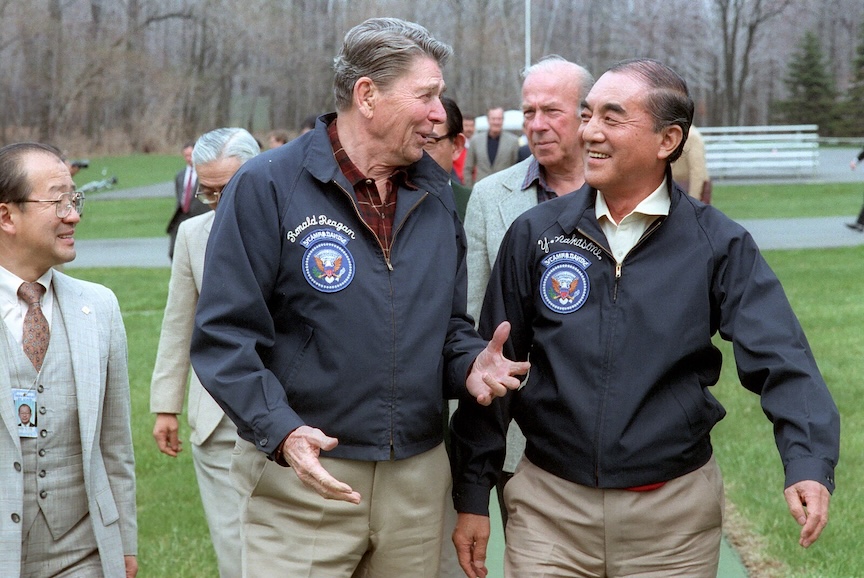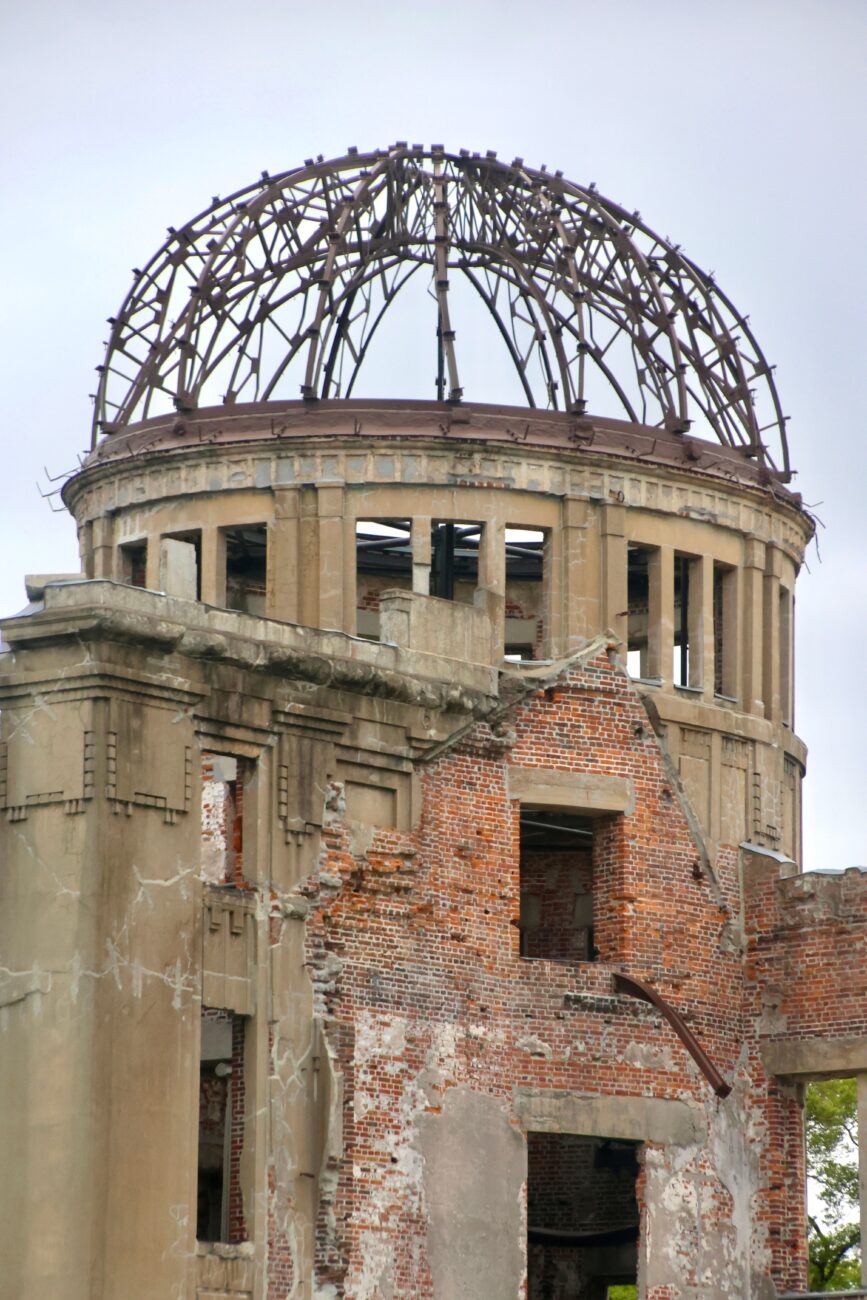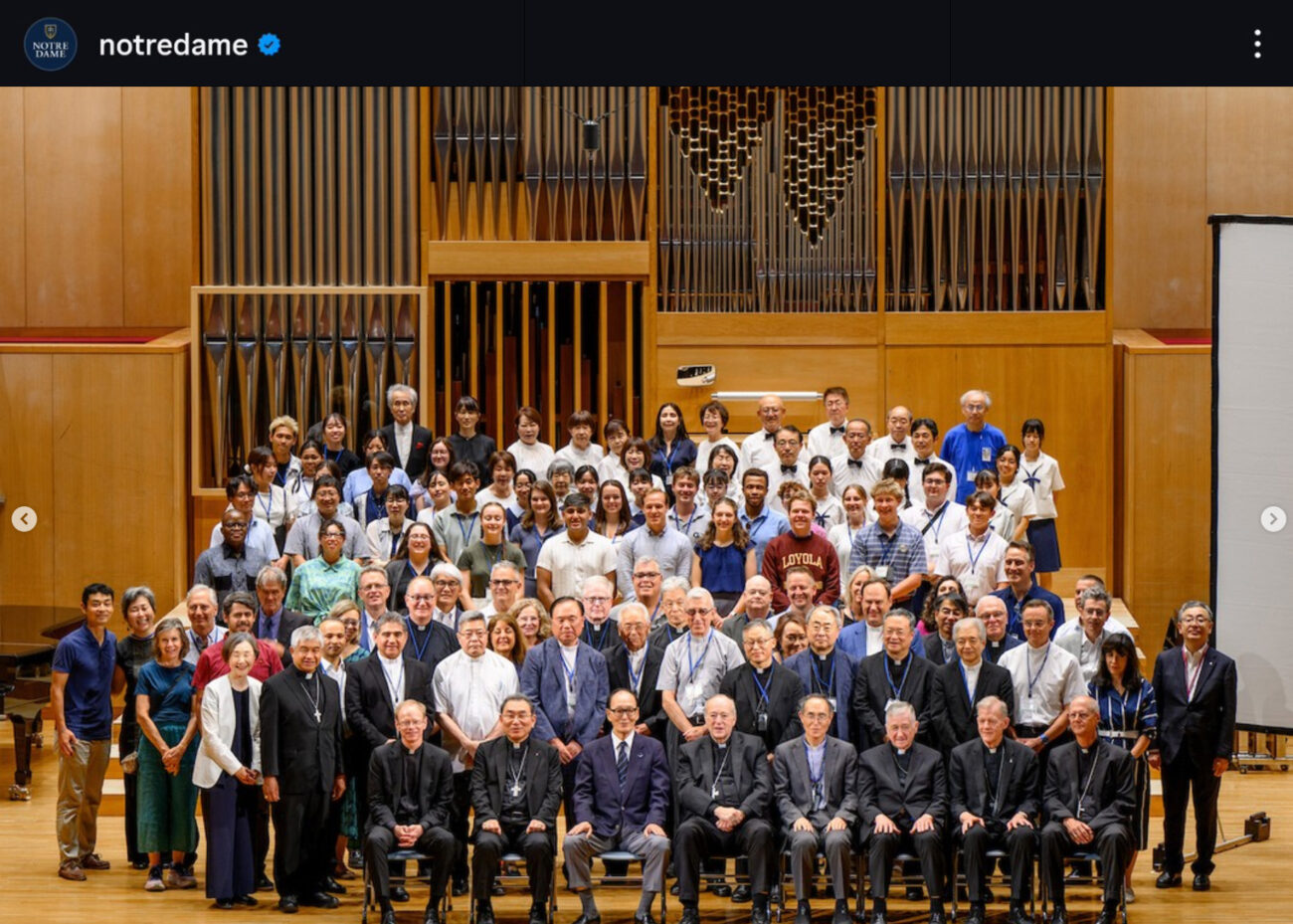Atomic Bomb Dome (Hiroshima City, Hiroshima Prefecture)
Introduction
While in Japan last month with Cardinals Blase Cupich and Robert McElroy, Rev. Robert A. Dowd, C.S.C., the new president of the University of Notre Dame, joined them in condemning the storing of nuclear weapons as a deterrent to nuclear war and also denounced the atomic bombing of Hiroshima and Nagasaki by the United States that ended World War II.
Here’s what happened:
Cardinals Cupich and McElroy and two other bishops led a “Pilgrimage of Peace” to Japan to mark the 80th anniversary of the atomic bombing of Hiroshima and Nagasaki, which brought World War II to an end. Father Dowd was with them.
The members of the delegation met with survivors of the bombings, lamented the tragedies visited upon the two cities, and reflected upon issues of war and peace. Media coverage was extensive.
During their visit, delegates took on two controversial issues: (1) The morality of the United States’ bombing of the two cities, and (2) the morality of the policy of “nuclear deterrence” practiced by the United States and other nuclear powers and the related issue of nuclear disarmament.
Pacifism and the US Bombing
In a concluding statement, the American bishops, joined by Japanese and Korean bishops, called for nuclear disarmament and condemned both the bombing and the deterrence policy and, indeed, war itself.
We strongly condemn all wars and conflicts, the use and possession of nuclear weapons, and the threat to use nuclear weapons.
This unqualified pacifism collides with the Church’s “just war” doctrine as well as with the separate statements of both Cupich and McElroy, who want to limit, but not discard, the doctrine. One senses “virtue signaling” because of time and place.
But aside from the “all wars” proscription, the statement faithfully reflected the view of Pope Francis.
Pope Francis vs. Pope John XXIII and St. John Paul
In a 2017 Vatican conference co-sponsored by Notre Dame’s Kroc Institute, the Pope said “nuclear weapons are not only immoral, but must also be considered an illegal means of warfare,” and declared:
“[T]he threat of their [nuclear weapons] use, as well as their very possession, is to be firmly condemned.
As the Arms Control Association reported, this reflected a “notable shift” from his predecessor’s views on the possession of nuclear weapons. “The Catholic Church,” the Association, observed, “has accepted nuclear deterrence on a limited basis.”
The 1963 papal encyclical “Pacem in Terris” stated that minimum nuclear capability to deter a nuclear attack is acceptable as an interim ethic until disarmament is achieved. Pope John Paul II reiterated this in 1982, noting that nuclear deterrence is morally acceptable as a “step on the way toward a progressive disarmament.”
Father Dowd
Finally, we note that, without condemning the possession of nuclear weapons, Pope Leo XIV has cited favorably (and briefly) Pope Francis’s dismissal of “the illusion of security founded on mutually assured destruction.”
Other Voices
For those who sense an air of crippling unreality about the condemnation of the possession of nuclear weapons to support the policy of deterrence, we republish below (with permission, copyright reserved) Dr. Robert Royal’s article “How I Haven’t Stopped Worrying and Still Don’t Love the Bomb,” which was first published in the estimable The Catholic Thing.
As to the much mooted question of the morality of the bombing of Hiroshima and Nagasaki, it happens that one of the leading defenders of Truman’s decision against critics like Father Dowd is Notre Dame’s Rev. Wilson D. Miscamble, C.S.C., an award-winning author and historian in particular of the Truman era.
In his book The Most Controversial Decision: Truman, the Atomic Bombs, and the Defeat of Japan (Cambridge Essential Histories), Father Miscamble argues that Truman’s action was the least awful of the terrible options open to him. It prevented much greater bloodshed and stopped the veritable flood of killing on all sides throughout Japanese-occupied Asia. Further, Fr. Miscamble explicates that Truman did not turn his back on some feasible moral course of action that would have secured Japan’s surrender. Father Miscamble asks that those who criticize the use of the atomic bombs might place themselves in Truman’s shoes and determine what they would have done in the circumstances.
Watch below Father Miscamble’s five-minute Prager U analysis of President Truman’s decision to use the atomic bomb as both necessary and moral.
Dr. Royal’s: How I Haven’t Stopped Worrying and Still Don’t Love the Bomb
Monday, August 11, 2025
Which brings us to the “Pilgrimage of Peace” to Japan a few days ago by four American bishops – Chicago Cardinal Blase Cupich, Seattle Archbishop Paul Etienne, Santa Fe Archbishop John Wester, and Washington’s Cardinal Robert McElroy – for the 80th anniversary of America’s nuclear attacks in World War II.
Cardinal Cupich rightly called for a return to the classic just war criterion on not attacking civilian populations and limiting warfare to combatants. Cardinal McElroy called for the abolition of nuclear weapons and cited Pope Francis that nuclear deterrence “is not a step on the road to nuclear disarmament but a morass.” Indeed, that’s true, but there are worse things than morasses, such as tyrannical states having weapons that they are not afraid to use because there is no reason not to.
So even as Church officials expound such worthy ideals – which they do often – in a wider view, unless there are achievable alternatives, their remarks are overly idealistic, bordering on irresponsible and even in a way themselves immoral. The Church, when it speaks of public affairs – which should be infrequently and very carefully – has to take into account that we live in a fallen world (which is part of its reason for being) after all. And in a fallen world, deadly threats, even man-made potential for global apocalypses, have to be handled carefully, calmly, but firmly.
I regard Pope Leo XIV, so far, as a man who typically displays those very traits. He hasn’t been making himself a public spectacle by injecting himself into every public issue. And his demeanor is sober and thoughtful. So it was unfortunate to see that he, too, weighed in on the question of nuclear arms in what seems a simply unrealistic way.

President Ronald Reagan with Prime Minister Yasuhiro Nakasone of Japan, 1986 [photo: National Archives, Washington, D.C.]
Last week, he called for nuclear disarmament – again a goal devoutly to be pursued: “True peace demands the courageous laying down of weapons – especially those with the power to cause an indescribable catastrophe. . . .Nuclear arms offend our shared humanity and also betray the dignity of creation, whose harmony we are called to safeguard.”
A worthy ideal and a proper warning.
But how would you get from here to there? Diplomacy? At the very least, it would call for much more rational world leaders than we have, or are likely to have. And it would mean those non-existent world leaders would all have to trust one another at the same time, and to the same degree such that they would be willing to make their nations vulnerable by disarming. Does that sound remotely possible given Putin, the Chinese Communist Party, the radical Hinduism of today’s India, not to mention Pakistan, Israel, North Korea, Iran? We always hope for newer and better leaders, but does world history give us any reason to believe that we would see a whole crop of such philosopher-kings, simultaneously, in every nuclear nation, in any imaginable future?
And the idea that some international body can eliminate nukes is a pipedream. Bertrand Russell, once a prominent modern philosopher, was early in realizing the dangers of a nuclear world. His solution deserves quotation at length. He proposed:
the establishment of an international government with a monopoly of serious armed force. . . . not an amiable façade like the League of Nations, or a pretentious sham like the United Nations under its present constitution. An international government, if it is to be able to preserve peace, must have the only atomic bombs, the only plant for producing them, the only air force, the only battleships, and, generally, whatever is necessary to make it irresistible. Its atomic staff, its air squadrons, the crews of its battleships, and its infantry regiments must each severally be composed of men of many different nations; there must be no possibility of the development of national feeling. . . .Every member of the international armed force should be carefully trained in loyalty to the international government. The international authority must have a monopoly of uranium, and of whatever other raw material may hereafter be found suitable for the manufacture of atomic bombs. It must have a large army of inspectors who must have the right to enter any factory without notice; any attempt to interfere with them or to obstruct their work must be treated as a casus belli. They must be provided with aeroplanes enabling them to discover whether secret plants are being established in empty regions near either Pole or in the middle of large deserts.
Quite logical, but also. . .quite mad. And impossible.
I don’t like that the world in our time is like this. Who does? And I very much support Pope Leo’s repeated emphasis on peace in the world and, above all, in our hearts. But in a fallen world, peace is of necessity a complicated international dance. It’s urgent that we also recognize that.
Support Our Common Purpose
If you share our love for Notre Dame and want to see an authentic Catholic renewal under the Dome, please consider lending a hand in whatever way you are able — by giving of your time (especially in prayer), talent, or treasure. The funds we receive are used to continue our work to keep you informed of Notre Dame’s imperiled Catholic identity, organize events and activities to strengthen our collective voice, and financially support the efforts on campus by students and their organizations to stand tall for the Truth of Catholicism.
Oremus
O God of Truth and Love, You have called us into a loving and faithful relationship with You. Your Son identified Himself as the Way, the Truth, and the Life, and called us to follow Him wherever He goes.
In their care for and guardianship of the University and the students it serves, may the administrators of the University of Notre Dame always commit themselves to the pursuit and embrace of the Truth, which alone can set us free.
May the Holy Spirit lead them into all truth and recall them to it in times of peril. May they embrace the sorrow that comes from being different from, and rejected by, the world, so that they may rejoice always in the goodness of the Lord.
In the day of battle, may they joyfully take courage in Him who has already overcome the world.
We make our prayer through the intercession of Notre Dame, Our Mother, and in the Name of Jesus, Your Son, who lives and reigns with You, in the unity of the Holy Spirit, God, forever and ever. Amen.
The above prayer is by Sycamore Trustee Father John Raphael (’89). To join us in regular prayer projects such as our Novena for Catholic Education and our Meditation on the 12-Days of Christmas, please join our Apostolate.
Submit Your Mass Intention
Father John J. Raphael (’89) offers a monthly Mass for the intentions of our Sycamore Trust community. If you have an intention that you would like him to include at his next Mass, you may submit it by clicking on the following button.





Interested in ST investigating strange alumni club structures in US. Some clubs have elections. Ours has not had an election in over 10 years. Or meetings. Friends of the “pres” are appointed to lead.
Thank you, Bill. I’d like to learn of how Fr Dowd came to be a member of this delegation.
I am not new to this issue. In high school (1964-68), I and many of my friends read John Hersey’s “Hiroshima.”
I have listened to Fr Dowd and Fr Miscamble and have read Robert Royal. I’d like to bring to your attention UK Lord Andrew Roberts’ essay in Wall St J on August 7 “The Case for the Atomic Bomb, 80 Years Later.” Until I read his piece, I had no memory of having learned that the Japanese planned to execute all Allied POWs — that is, hold them hostage against an American invasion. It is a point Fr. Miscamble makes.
A couple points. First, if the hibakusha are witnesses to the reality of nuclear weapons (and they are!), I am too. My father’s book published posthumously in 2012 is entitled “The Pacific War and Battle of Iwo Jima: Recollections & Essays.” One of his essays is about the morality of the atomic bomb which he favored. He landed on D-Day plus one on Iwo Jima. He and his men, and my sister’s father-in-law, were preparing to invade Japan when the bomb was dropped. He returned home and had six more children, including me, with my mother.
Second, yes, it is true that the atomic bomb is “barbarous” as Fr. Dowd says. But I submit that every military innovation has been barbarous in its own time. Guns, gunpowder, artillery. Some Civil War soldiers shot into the air rather than focus on an individual across the field which they thought would be murder. The Gatling gun of 1862 was barbarous. I have read Paul Williams’ analysis between WWI and WWII on the morality of aerial bombing — dropping bombs from the skies being flown by the new invention, the aeroplane. Barbarous. While at ND (Class of ’72) taking an introduction to international relations, my classmates and I were introduced to the firebombing of Tokyo and Dresden. And now hypersonic missiles and blizzards of drones.
Father Dowd,
Are we entitled to defend our families? Are we entitled to defend God, Country and Notre Dame?
Should we throw out all weapons that are opposed to evil? Should we discard the pen that is a sword — a student newspaper that reports on a professor’s views favoring abortion at a Catholic University? Should we throw out the weapon of a filter on discernable issues that affect purity of heart, mind and soul of our students? We could go on and on, Father. Yet, the greatest Pope of our lifetimes, Pope Saint John Paul II lived through evil and knew that evil, when “tolerated” as proposed by these statements becomes the norm. In the Confiteor, we confess what we have failed to do, as well as what we have done. As the Venerable Archbishop Fulton J. Sheen said: one of the greatest evils of our time is extreme “toleration.” Jesus said to love one another. Are we loving our families, our friends, our fellow citizens by unilaterally disarming? I would pose the probability that this is tolerating sin or even promoting it. See what has happened in Ukraine by our silence, our reliance on the falsehoods of a KGB agent dictator, and his “religious leader,” Kirill, himself a former KGB agent who gave approbation to evil and its war criminal dictator. That dictator is one who has repeatedly threatened the use of nuclear weapons on the world and on a country that in 1994 gave up its nuclear weapons in return for a guarantee of peace (the Budapest Memorandum).
I pray for all priests, and for peace in the world. Yet, doing nothing in the face of evil is itself evil.
Love, not toleration, conquers all.
Don’t they know that EXTROADINARY CARNAGE is happening in Chicago. They don’t need to go to Japan to attempt something good.
To be honest this was an extremely disappointing article and really missed the mark in my opinion. Atomic bombs clearly violate just war theory and any Thomist who isn’t captured by right liberalism will point this out (see Anscome and Feser on this for example). Obviously this aligns with the fake notion of liberal human rights so it’s “easier” to condemn this action vs let’s say abortion or contraception, which is why Notre Dame is very loud on these issues but nearly silent on the “inconvenient” issues and that is a valid criticism. However, atomic bongs are clearly evil and anyone defending shows they value being against progressives and with Reagan era style right wing moralistic therapeutic deism that smuggles in consequential ethics over genuine Catholicism.
If possession of nuclear weapons is immoral, the necessary consequence is unilateral nuclear disarmament and the resulting extinction of democratic government and human rights across the globe. This is good reason to question the assertion that Catholic moral teaching requires acceptance of the Francis rather than the John/John Paul position. But we presented both views and readers can judge for themselves.
Hi Bill, nice that you weighed in.
The pope needs to write a detailed encylical about this issue that revisits all the rich public discussions from roughly 40 years ago, but referencing the very dangerous geopolitical climate of today. I sent an email to the papal nuncio the other day and hope the pope produces such a document. The faithful need a lengthy, analytical treatment of this issue. Something based squarely in the Catholic philosophical tradition, not emotivism and not off-the-cuff. The new pope was trained in mathematics; I hope an encyclical will reflect, mutatis mutandis, that level of rigor.
The Catholic intellectual sphere likewise needs to engage this topic–full court press. The relative silence on this issue is odd, and clamorous.
In 1987, Finnis, Boyle, and Grisez wrote a book about nuclear deterrence that reflects considerable thought and deep research. This effort was quite commendable, though it needs an updated version. (To lay some cards on the table, I’m not in the new natural law camp and hope that a full, traditional Thomistic approach appears, and soon, given events unfolding.)
I’m of the view that unilateral disarmament would be foolhardy, given the instabilities it could introduce and that could precipitate nuclear war. On the other hand, I think there is a moral obligation for leaders to make an intensive effort to negotiate, even if the prospects for success are dim. And citizens need to push them to do so.
It’s like the prolife issue–we need to do what is practicable and keep the pressure on, and leave the rest in God’s hands.
One needn’t be in the “seamless garment” camp to see the analogies betwen the philosophical roots of the criticism of deterrence on the one hand, and the prolife stance on the other, all via natural law.
I’ve taken an interest in this topic this year and it is now an ongoing project. See my journalistic forays, for what they’re worth, on Townhall. They were inspired by Trump’s repeated calls for a drawdown in nukes. (Events may have caught up with a third op-ed in draft form.)
Brian Simboli (philosophy, ND, of yore)
The message of Christ, the foundation and tenets of our Catholic Faith mandate and require the naive lip-service as spouted by Dowd and others. Thank God they are not effective influencers with authority to craft public policy. Surely they would create ultimate catastrophe. Beyond that, I have yet to sense from such “men of cloth” any equivalent moral outrage for the near universal acceptance of the evil of murdering innocents (and innocence) in the wombs of women–or indulging mutilation and sterilization of troubled “trans kids.” (Those are topics they should focus on. In humble respect, Steve Martinek 1971, 1974
Given their unrealistic view of the world, I wonder what their opinions of the Great Crusades and Charlemagne are? Do they feel that those were immoral as well? In my opinion the best service they can render to the Church, and to the world, is to just shut up; especially as to matters clearly outside their lanes. Remember: “Render into Caesar what is Caesar’s and to God what is God’s”.
It takes two to tango or to have successful de-nuclearizion. If one unilaterally gets rid of their nukes and the second party does not, the first party loses. Simple. Maybe someday we will have adversaries where mutual trust would abound. Unfortunately not today’s Russia or China.
Father Dowd is a naive man that seemingly lacked the backbone to challenge the narrative of the “Pilgrimage of Peace” mission he accompanied. Most senior Notre Dame graduates understand that the use of atomic weapons in Japan to bring an end to war saved 500,000 or more American and Japanese military and civilian lives that would have otherwise been lost. It is unfortunate that Notre Dame continues without a strong leader.
Completely agree with you.